 Amphibious armored vehicle unit conducts open sea drill
Amphibious armored vehicle unit conducts open sea drill
 Water relay in Henan
Water relay in Henan
 Ethnic culture feasts eyes of travelers
Ethnic culture feasts eyes of travelers
 80 security dogs assembled in Nanjing police dog training base
80 security dogs assembled in Nanjing police dog training base
 Graffiti artists paint on street walls in Xinjiang
Graffiti artists paint on street walls in Xinjiang
 Story of ceramic artist Zhang Lingyun
Story of ceramic artist Zhang Lingyun
 Magic summer night dream in Hongyuan
Magic summer night dream in Hongyuan
 Incredible creatures in headwaters drainage region of Lancang River
Incredible creatures in headwaters drainage region of Lancang River
 The future of rock n' roll seen in young rockers in China
The future of rock n' roll seen in young rockers in China
 Magnificent Yanziya Cliff
Magnificent Yanziya Cliff
BEIJING, Aug. 14 -- China's prestigious Lu Xun Literature Prize has come under fire after its most recent award winner for poetry was denounced as a "shame on poetry."
Zhou Xiaotian, a poet and professor of the literature and journalism college of Sichuan University, won the prize on Monday for his poem collection "Jiang Jin Cha" or invitation to tea.
Not long after the announcement, Zhou's verses were posted online by Internet users with the charge of being "nothing more than doggerels unworthy of the prize."
Many have criticized the winner for the colloquial style of his poems based on the late singer-actor Leslie Cheung from Hong Kong and another on Nobel prize winner in physics Yang Zhenning.
"The 28-year-old wife and the 82-year-old husband, one for talent and the other for lust," according to a line of his poem on the physist's high-profile marriage at the age of 82 in 2004.
"I've never heard of this poet, but I'm suspicious of the quality of his works submitted to the committee after reading those provided by online users," said Fang Fang, a writer based in Wuhan, Hubei Province.
"Are those judges really adept? Did they make judgement on the work's quality or on the candidates' connections?" Fang added, casting doubt upon the professional ethics of the judging panel.
Zhou, however, has refuted the criticisms on his work.
"Doggerels are not necessarily ill-written poems. You can hardly expect people to read serious poems nowadays," Zhou said in an interview with Xinhua.
He defended the fairness of the selection process, saying the whole procedure of voting was transparent based on a real-name system.
Zhou's argument was backed by professionals. Fan Xing, professor with Wuhan University, said it is almost impossible for a poet to ensure every single verse is well-written.
"It's only some of Zhou's poems that have aroused controversy," Fan added, while admitting some lines are unrefined.
The prize named after Lu Xun, one of China's best-known modern authors and essayists, was first awarded in 1986.
Writers of outstanding short- to middle-length novels, poems, prose, essays, reportage, literary reviews and theoretical works will receive the award, which is bestowed every three years.
It is not the first time the literature prize has been put in the spotlight.
In 2010, Che Yangao, secretary of the discipline inspection committee in Wuhan, capital of central China's Hubei Province, was awarded the prize for his collection of poems "Yearning for Warmth," which was criticised for being overly simplistic.
Many of the current elite literature awards have not been well received by the public, not just the Lu Xun Literature Prize, Ding Xiaoyuan, vice president of the Chinese Reportage Association, said.
"Professional judges should listen to public feedback, rather than sealing up literature in an ivory tower," he warned.
 Beijing policewomen posters become a hit
Beijing policewomen posters become a hit Armored regiment trains on the sea
Armored regiment trains on the sea Children spend 'Father's Day' with dads at work
Children spend 'Father's Day' with dads at work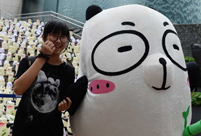 'Pan Da' appear in Shanghai World Financial Center
'Pan Da' appear in Shanghai World Financial Center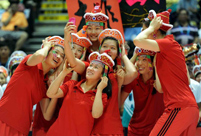 Champions take selfies on podium
Champions take selfies on podium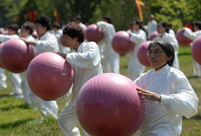 National Fitness Day celebrated around China
National Fitness Day celebrated around China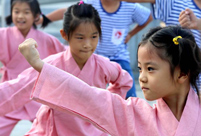 Traditional culture colors summer vacation
Traditional culture colors summer vacation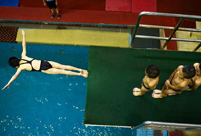 Young athletes fighting for their dreams
Young athletes fighting for their dreams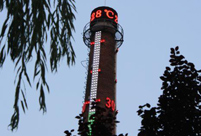 68 meters high thermometer in Shanxi, called ‘fighter’ of thermometers
68 meters high thermometer in Shanxi, called ‘fighter’ of thermometers The vanishing folk skills
The vanishing folk skills Intoxicating beauty of Dali, Yunnan province
Intoxicating beauty of Dali, Yunnan province Memorable moments of Ludian earthquake
Memorable moments of Ludian earthquake Bring world together to help elephant
Bring world together to help elephant 'Building Dreams'
'Building Dreams'  Labrang Monastery
Labrang MonasteryDay|Week|Month